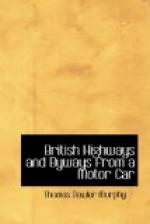We found Monmouth an unusually interesting town on account of its antiquity and the numerous historic events which transpired within its walls. At the King’s Head Hotel, which of course afforded shelter to Charles I when he was “touring” Britain, we were able with difficulty to find accommodation, so crowded was the house with an incursion of English trippers. Monmouth’s chief glory and distinction is that it was the birthplace of King Henry V, Shakespeare’s Prince Hal, whom William Watson describes as
“The roystering prince
that afterward
Belied his madcap
youth and proved
A greatly simple warrior lord
Such as our warrior
fathers loved.”
The scanty ruins of the castle where the prince was born still overlook the town. Thus King Henry became the patron of Monmouth, and in front of the town hall has been erected an inartistic effigy of a knight in full armour, with the inscription, “Henry V, born at Monmouth, August 9, 1387.” The old bridge over the river Monnow is unique, with an odd, castellated gateway at one end, probably intended not so much for defense as for collecting tolls.
After dark we wandered about the streets until the church-tower chimes warned us of the lateness of the hour. And even these church bells have their history. When King Henry sailed from a seaport in France on one occasion the inhabitants rang the bells for joy, which so incensed the monarch that he ordered the bells removed and presented them to his native town. We saw too little of Monmouth, for the next morning we were away early, taking the fine road that leads directly south to Tintern and Chepstow.
The abbey-builders chose their locations with unerring judgment, always in a beautiful valley near a river or lake, surrounded by fertile fields and charming scenery. Of the score of ruined abbeys which we visited there was not one that did not fulfill this description, and none of them to a greater extent—possibly excepting Fountain’s—than Tintern. In the words of an enthusiastic admirer, “Tintern is supremely wonderful for its situation among its scores of rivals. It lies on the very brink of the River Wye, in a hollow of the hills of Monmouth,




